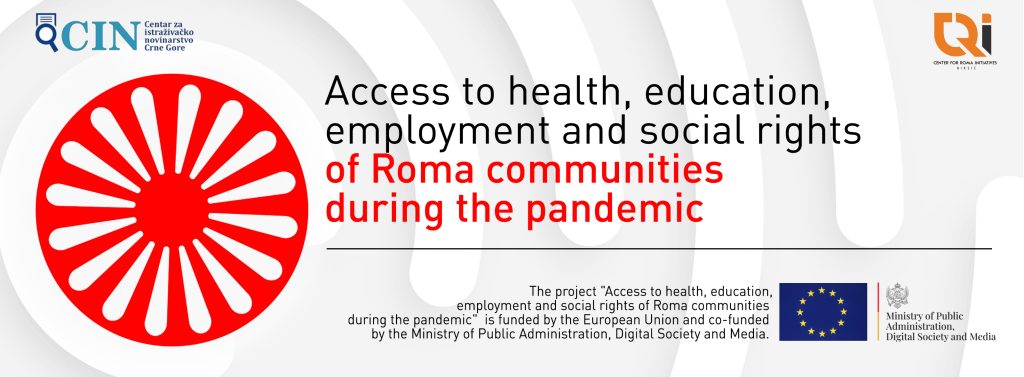INSUFFICIENT MEDIATORS FOR THE ROMA AND EGYPTIAN COMMUNITIES: Without Support, There is No Progress

Montenegro currently has just 46 mediators working across social protection, child welfare, employment, healthcare, and education. Although domestic and international organizations have been raising alarms for years about the critical need for more mediators, no government has yet taken meaningful action to address the issue.
Andrea Jelic
Sanja Selimović serves as a mediator for the Roma and Egyptian communities in the fields of social protection in Bijelo Polje and Berane. On a daily basis, she helps families access material assistance, disability benefits, and other social services. She also assists with scheduling medical appointments, obtaining necessary documentation, and navigating school requirements. On average, she supports up to five individuals each day. In these cities, as in many other parts of Montenegro, the demand for mediators far exceeds the supply.
"The biggest problem is that there is no healthcare mediator in Bijelo Polje, so I take on that responsibility as well," Selimović explains to the Center for Investigative Journalism of Montenegro (CIN-CG).
According to the 2011 Census, around 6,000 Roma and 2,000 Egyptians live in Montenegro. Nearly 1,000 of them reside in Bijelo Polje and Berane.
In recent years, almost every European Commission report on Montenegro has emphasized the urgent need for more mediators and called for their formal inclusion in the public administration system. However, no government has yet tackled this issue in a substantial way, despite some ministries suggesting future increases in mediator numbers. Many people, in fact, are unaware that these services even exist.
Data from the NGO HELP reveals that of the 34 individuals who completed certified mediator training, 21 are now working in local institutions (social work centers, employment offices, and healthcare centers) in nine municipalities. Of these, seven are employed at social work centers, six at employment offices, and eight at healthcare centers. Since the completion of HELP's training program at the end of 2022, mediators have been contracted through the Ministry of Human and Minority Rights, with positions lasting for one year, beginning in January of this year.
Sanja's sister, Tanja, also works as a social protection mediator in Berane and Bijelo Polje. They commute between the two cities, covering their transport and accommodation costs from their minimum wage of €450.
In Berane, many Roma and Egyptians speak Albanian or Sinti Roma, languages that the Selimović sisters do not understand, making their work even more challenging.
"The number of mediators in all institutions in Montenegro should be increased. It would make our work much easier and create a network that we could all rely on to help users," says Tanja Selimović.
The Role of Mediators in Accessing Services
According to HELP, mediators have made it easier for members of these communities to access essential services in healthcare, education, employment, and social protection.
"The number of people using healthcare services has increased... More individuals are now registered with employment agencies and are attending various retraining programs for faster access to work," the NGO notes. "In addition to helping with social protection rights, mediators often provide additional support to vulnerable or dysfunctional families."
Unmet Needs: A Story of Desperation
Arnela (name changed for privacy) is a mother of seven living in dire conditions in Konik, Podgorica. She lives in an improvised hut with her husband and children, some of whom are of school age but do not attend school. Due to their extreme poverty, they are forced to beg. Despite their obvious neglect and malnutrition, Arnela doesn't know where to turn for help.
"I’ve never heard of any mediators who could show me a way out of this situation. I don’t even know how to approach them, what I would say, or where to start," says Arnela, who is in her early thirties.
She has been pregnant 10 times, with three pregnancies ending in abortion, leaving her with serious health complications. Despite these challenges, she remains unaware of her rights or available support services.
The Ministry of Labor and Social Welfare (MRSS) told CIN-CG that there are only nine mediators employed within Montenegro’s social and child protection system.
Research by the DeFacto Consultancy Agency in 2020 for the Strategy for the Social Inclusion of Roma and Egyptians (2021-2025) showed that nearly half of Roma and Egyptians access social services through centers for social work, with one-third receiving monthly financial assistance. However, barriers such as lack of information, language difficulties, and discrimination prevent many individuals from fully utilizing their rights to social benefits.
Mediators and the Prevention of Child Marriages
The role of mediators is also crucial in addressing serious issues like child marriage within Roma and Egyptian communities. According to a 2017 study by the Center for Roma Initiatives Nikšić (CRINK), the rate of child marriages is significantly higher in these communities, with over 28% of women and 16.5% of men aged 15-19 being married or in a union.
"Promoting the engagement of Roma and Egyptian mediators in awareness campaigns is essential," the study argues.
Zena Dubović, a mediator from Berane, has worked for years to prevent child marriages in her community, despite facing resistance. "It would help a lot if there were more mediators to share the workload," she says.
The Employment Crisis
Data from the Strategy for the Social Inclusion of Roma and Egyptians shows that only about 800 Roma and Egyptians are registered with Montenegro's Employment Agency, with most of them being women. The Roma and Egyptian communities account for about 2% of the country's total unemployment rate, with more than 90% of those registered lacking formal qualifications. Many households have no employed members at all, while a significant portion has just one employed person.
The Ministry of Labor and Social Welfare has stated that in the near future, efforts will be made to bring the social and child protection system closer to young people from these communities.
Healthcare: A Major Gap in Mediators
In Podgorica, the capital city, there are only three mediators in healthcare for the Roma and Egyptian communities. The Ministry of Health did not respond to CIN-CG's questions regarding the total number of mediators in the healthcare system.
The Strategy for Social Inclusion stresses that the number of healthcare mediators should be increased, particularly to support displaced and internally displaced Roma and Egyptians who face significant challenges in accessing healthcare.
Education: Mediators in Short Supply
In the education system, there are just 25 mediators for approximately 1,750 Roma and Egyptian students. The standard quota is one mediator for every 70 children, though the system is struggling to meet even this minimum. Veljbana Naza, a mediator at an elementary school in Nikšić, serves around 200 students from the Roma and Egyptian communities. "It would be ideal to have one mediator for every 30 students," she says.
The Ministry of Education acknowledges the need for more mediators and plans to address this issue in the coming period. However, organizations like HELP have warned that the current quota system is inadequate, as one mediator cannot provide quality support to so many children.
The Lack of Mediators Hampers Social Inclusion
The insufficient number of mediators is preventing the social inclusion of Roma and Egyptian communities in Montenegro, according to HELP. Mediators in healthcare, social protection, and employment still lack formal recognition in the public administration system. HELP advocates for the systematization of these positions and better working conditions for mediators, who often work under short-term contracts and receive minimal pay, with most of their salary going towards transportation costs.
The COVID-19 pandemic underscored the vital role of mediators, with some being forced to visit multiple households and schools per day without proper resources. "Mediators need additional funding for transport and communication costs, especially when working with families that lack internet access," the NGO Mladi Romi argued during the crisis.
A Missed Opportunity
Despite the crucial role they play, many mediators work under challenging conditions, and the lack of proper recognition and support remains a significant barrier. If the state invested in more mediators, and if more people were aware of these services, lives like Arnela’s might be different—her children might attend school, and her family could escape the cycle of poverty and neglect. But for now, the lack of mediators means that many, like Arnela, are left without the help they desperately need.


